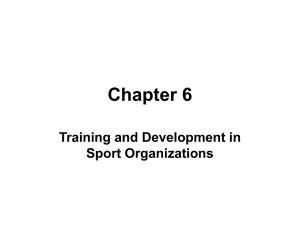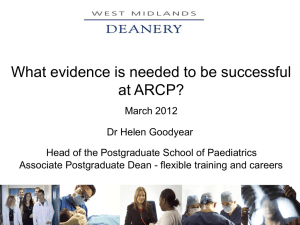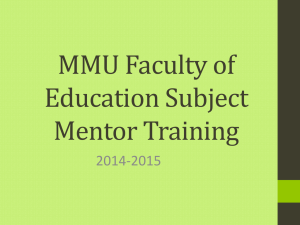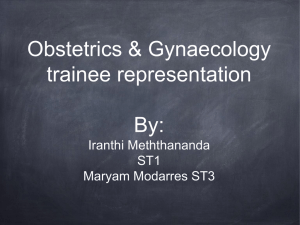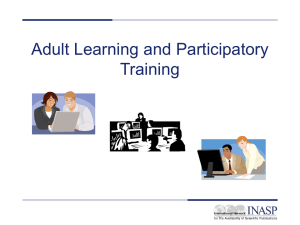ST Induction Slides - School of Psychiatry
advertisement
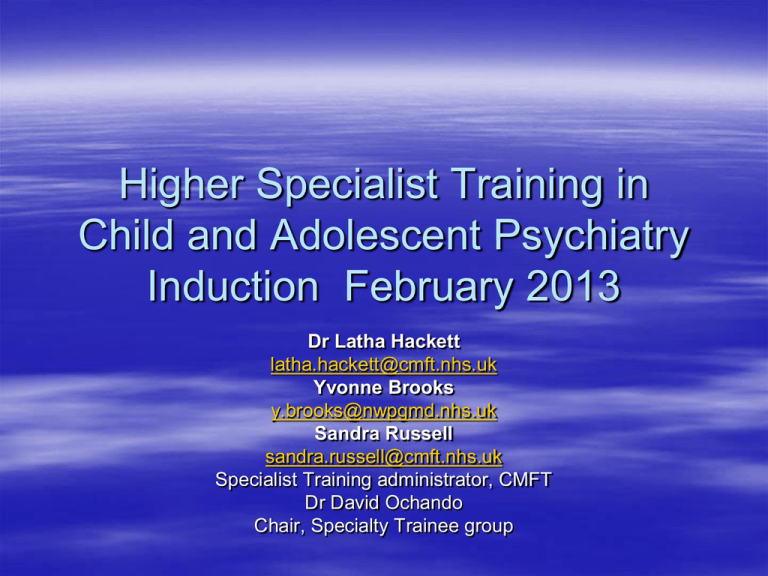
Higher Specialist Training in Child and Adolescent Psychiatry Induction February 2013 Dr Latha Hackett latha.hackett@cmft.nhs.uk Yvonne Brooks y.brooks@nwpgmd.nhs.uk Sandra Russell sandra.russell@cmft.nhs.uk Specialist Training administrator, CMFT Dr David Ochando Chair, Specialty Trainee group Child and Adolescent Psychiatry higher Specialist Trainee Induction to the Programme (For New and other trainees) 10.15 coffee 10.30 -12.00 Overview of the Programme Dr Latha Hackett, Training Programme director, David Ochando, Chair, St4-6 in child and adolescent Psychiatry Yvonne Brookes, Specialty School manager, NW deanery, Sandra Russell, Specialty Training Administrator, CMFT The following to be organised by Dr Aslam on a separate day Portfolio ARCP METIS – Trainee & Neelo Aslam Research on the Programme – Professor Jonathan Green/Dr Rachel Elvins Academic Programme – Professor Jonathan Hill Therapeutic Modalities – Dr Neelo Aslam On call on the scheme – trainee Mandatory training – Dr Aslam The Scheme Training Scheme Deanery School of Psychiatry CAPFECC - Curriculum Training Programme – Academic, Case presentation Guidelines, therapeutic skills training, research, Management Training. GMC The Scheme Trainees meeting with the training Programme Director Trainee, Trainer and Training Programme Director Meeting Training Plans/Learning objectives. End of year Report. E-portfolio, PDP, WPBA, Mandatory training Scheme Mentors. Appraisal and assessment –ARCP Placement evaluation form – Training Committee and School Study leave Applying for CCT Travel Expense Training Scheme. Northwestern scheme. NTN - 22 Salaries WT- 19 Posts approved 24 Salaries - 10 in CMFT, 2 Bolton, 2 Pennine care, 3 GMW, 1 Burnley, 1 in Leyland (Chorley) September 08 – EWTD compliant: 1:8 rota for Greater Manchester Training Scheme St’s - WT - 14 Flex – 4 1 vacancy NTN’s used - 18 out of the 22 Buddying system – all Trainees allocated will have a named senior trainee as a buddy when they first start to help them settle. Buddies You should have been allocated a buddy Do you know who your buddy is? The Scheme Specialty trainees (St4-6): St6: Dinesh Khanna , * Sally Albachary,*Samina Holsgrove (**) Louisa Draper, ***David Ochando, Krishna Madhusudhan, Sri Velandy, St5 Venu Bansal, Peter Sweeney, Omar Tariq, Vandna Saxena, *Katharina Junejo, Akhtar Kapasi, Dush Mahadevan. St4 - Sahana Kini, Zubair Ahmed, Nelu Ingirige, Amith Paramel and */**Nadia Ranceva * - LTFT ** ACF *** MLP 18 trainees St4-6 – 14 WTE, 4 LTFT 1 Vacancy The Deanery The post graduate Dean - Jacky Hayden. Associate PGD’s Psychiatry - Dr George Nasmyth. Specialty School Manager –Yvonne Brooks Appointment of TPD Meet twice a year on away days with all chairs of Training Committees and DME other medical educators- May & Sept School of Psychiatry Head of School – Damien Longson TPD’s for ST 4-6 General Adult –A Poynton Old Age – Harry Allen LD – Carol Harvey Psychotherapy - Mark Evans Forensic - Simon Plunkett CAP – Latha Hackett TPD – Core Training 1,2,3 TPD’s (Dr Graham Ness, Taseer Kazmi, Lucy Aitkin. Lancashire Care – Venu Duddu School administrator – Sam Abbott School of Psychiatry Operational board Head of school, Associate dean, DME (MMHSCT, GMW, Pennine Care, Lancashire Care), Academic, Regional rep for Psychiatry, Pastoral Care, Quality assurance, Core training TPD’s & St4-6 TPD’s Specialty Manager and School administrator School Board The operational board + All tutors and TPD’s Trainee reps Lay representative Child and Adolescent Psychiatry Specialty training committee Chair - Training programme director. Deputy Programme Directors- Drs Neelo Aslam, Mischa Mockett, Kenny Ross, Anne Shortall Three way meeting – TPD, Dpty TPD s Shortall Yvonne Brooks – Specialty Manager Meet Twice a year - Autumn and Summer – PP3 or Winnicott Centre ST group Chair & STSC rep Dr. David Ochando Deputy Chair & STSC rep Dr. Katharina Junejo Academic rep Dr. Sri Velandy Research Rep Dr. Dush Mahadevan Management Dr. Omar Tariq Therapeutic Modalities Dr. Krishna Madhusudhan Legal Aspects Dr. Omar Tariq Paediatric Liaison Dr. Akhtar Kapasi On-call Rota :West Dr. Vandna Saxena On –Call Rota:East +Central Dr. Sahana Kini Incident review panel , Network Board and On-call Website Management group – Dr. Peter Sweeny, Dr. Krishnan Madhusudhan STSC All trainers are members of the STSC Trainee representatives – 1 Whole time + 1 Flexible trainees. Sub Group ( all have a trainer lead and a trainee rep -in italics) Academic Programme director – Ruth Marshall, Professor Jonathan Hill, Tim Morris, Mischa Mockett, Louise Theodosiou, Latha Hackett, Sri Velandy Research Coordinator - Dr Jonathan Green, Sri Velandy Management training – Tim Morris, Roshelle Ramkisson, Omar Tariq STSC Therapeutic Modalities - Neelo Aslam & Krishna Madhusudhan Legal Aspects Training – Dr Kenny Ross & Omar Tariq/Akhtar Kapasi Paediatric liaison – Dr Hilary Lloyd & Katharina Junejo, Akhtar Kapasi ST chair – Dr. David Ochando, Training on the Manchester Scheme Academic – 15 organised days. 1st Mondays of the month – academic training days(11), 2nd or 3rd Mondays – Regional training days (4 days a year) In placement – most experience gained over three WTE years ADI – video training available for all Sts. Video’s in my office, you can book it and I can help you on how to train yourself Special courses organised in house: *Management training, legal aspects and therapeutic modalities. Bought from out side – ADOS, Legal aspects etc Mandatory in first year – Child protection training, Break away training, Basic life support training Academic Programe Two trainers per day One chair of the case conference Case conference Consultant Two organising trainees Meet organising trainers – 3 months in advance, trainee sent out papers to trainees and all trainers Academic Programme Rawnsley Conference room, 1st working Monday ST business meeting Learning objectives of the day (Personal LO, what do you expect to learn from the day, end of the day what did you learn and how are you going to address this and reflect on what you achieved that day for portfolio signed by trainer of the day Overview of the topic of the day Journal papers Discussion of relevance of the day to clinical Practice/Research club Case Presentation Review of LO of the day Mandatory attendance – register will be kept by Sandra Russell and I will be informed at the end of the year when I write my TPD report for ARCP (75%) Academic Programme The two organising trainees + trainee for the case presentation meet with organising consultants for the day 3 months in advance Agree on the academic content Send programme to TPD & Academic programme organiser with all the papers – e or paper copy. Consultant for the case presentation – need to be told in advance that their case is being presented. He/she should be present. Hence minimum 4-5 trainers present for case conference Therapeutic Modalities Training Mostly in Placements CBT, Family Therapy and Psychodynamic Psychotherapy; Group therapy try and use opportunities 2012-2013 Family Therapy & Psychodynamic psychotheraoy – 6-7 whole days equivalent At the end of these sessions – report from trainer required for ARCP – attendance – 75%, SAPE, Psychotherapy ACE, essay marking etc Trainer/Trainee Hand book Introduction Job descriptions Induction to the Scheme Rotation and on call list Academic Programme Research – Prof Jonathan Hill to discuss further Therapeutic Modalities Programme Legal Aspects Training Management Training Paediatric Liaison Training – in preparation On call Safety at work place Audit of courses trainees have attended in the year 2006-2007 Forms - Evaluation of Training placement. ARCP – Gold guide summary and relevant section. RCPsych Occasional Paper 65 CAPFECC Chair – Brian Jacobs. CAPFECC developed curriculum and is developing assessment tool 2010 curriculum – you will be assessed against this Annual Cycle of review 1. Learning agreement: Aims and intended learning outcomes. Based on specialty curriculum. 2. Advice on portfolio 3. Regular feed back (two-way) 4. Personal development Plan 5. Educational supervisors structured report 6. NHS appraisal – end of portfolio or MMC Website Annual Cycle of review Educational Appraisal & WPBA A. Evidence 1. Assessment of Performance – WPBA, ESR, TPD Structured report ARCP & Outcome 2. Assessment of Experience Portfolio, audit, research, critical incidents, teaching B. ARCP – Appropriate Panel to consider the evidence. Review of evidence of progress, outcome of review, educational planning. Annual Planning TPD/deputy – meet trainee to – review ARCP outcome and plan next part of training Annual Review of Competence Progression – (ARCP -Gold Guide) July 2010 Portfolio should have the following: Evidence of Induction – Induction to the scheme, Induction to Trust, Induction to the department Personal development Plan –prepared by trainee signed by Trainer in the first month, linked to curriculum Three way meeting PDP or LO signed off by ES. TPD signing off annual planning of trainees learning – 6-8 weeks Interim review 6 months later - TPD and a deputy. ES sign off WPBA – These are not specified. But a minimum of 12 with a combination of ACE, MiniACE, CBD- all with reflective notes, MPAT – important and necessary on metis & Twice NHS appraisal. Form 4 sign off necessary for ARCP Psychological modalities training – evidence – supervisors report etc Research report – Evidence from supervisor Audit report – evidence – report, presentation, sign off from trainer Record of on call, teaching and feedback Management activity- reflections CPR and break away training PMETB survey Educational Supervisors structured report Training Programme directors Structured report All this recorded in your portfolio. Sam Abbott, School administrator will update ARCP – Panel A (July) No trainee present. Panel – TPD, Head of school and Regional representative To consider evidence and approve adequacy of the evidence and documentation Judge whether a trainee can progress to next stage of training ARCP Outcomes 1 Satisfactory progress .Achieving progress and the development of competencies at the expected rate *2 Development of specific competences required – additional training time not required *3 Inadequate progress by the trainee – additional training time required *4Released from training programme with or without specified competences 5 – Not enough evidence *2,3,4 – unsatisfactory progression ARCP – Panel B Trainee is present. This is when the ARCP outcome is not 1 Panel organised by the Deanery Appraisal and 360 degree assessment – MPAT on metis Trainers will appraise trainees before the ARCP in May/June using the DOH appraisal document all on metis Mini PAT – 360 degree appraisal x 2 – on metis Before the ARCP as well, the information collected by trainer and report given to Trainee for ARCP ARCP challenges January 2010 - 2 St4’s – both got outcome 1 July 2010 - 13 Specialty trainees presented 11 got Outcome 1 – panel A 2 outcome 5 had to do the following: no triangulation of evidence in summary of evidence and NHS appraisal. Got outcome 1 in the end In Jan & July 2010 – none of the child psychiatry trainee went to Panel B! This is an achievement in the school of Psychiatry July 2011, 15 trainees, Outcome 1=10, 6=2, 2=1, 3=2 (3 trainees to panel B) January 2012 – 6 trainees – Outcome 1 =1, 2=1, 6=4 (1 to panel B) July 2012 – 11 trainees - Outcome 1 =6, 2 =1, 3 =1, 6=3 (2 to panel B) January 2013 – 5 trainees attended Most cases of outcome 2 – inadequate evidence and not linking the evidence - poor triangulation of evidence Annual Leave & Sick Leave Annual leave - 25 days to start Third increment - 30 days. 8 public holidays + 2 extra statutory holidays – you need to check this with the trust you work for. In CMMC no hospital holidays but you get 4 extra days! Leave year - 1.11 - 31.10. Sickness absence - Trust. Trainee has to make two phone calls – one to base and other to medical staffing at place of work. 3-7 days self certification. Over 7 – GP sick note. Weekends are included in sick leave. More than 7 days - PG med personnel informed. Greater Manchester West employs all trainees Any leave/rota issues should be raised with the local medical staffing. For any pay issues you should contact GMW lead employer. Study leave 30 days a year - 15+ 7 days on the Programme. Budget - WTE-£805/ year. Flexible pro-rata 6 sessions £492(?) Study leave forms available electronically “CAPSAC requires” - 30 academic sessions per year. 11 SpR academic days. Regional days - 4. Therapeutic modalities - 7 days; 08-09 CBT & Psychodynamic Have 8 days to attend other courses Courses usually attended Research module - £250 Autism Diagnostic Observation Schedule £850 – reduced for str. Contact Kleo at Harrington bldg RCP – CAP faculty Residential conference - £500-600 Legal aspects – £100-250 (local, RSM with college) Webster Stratton - £400 Management – Free - £1000 Manchester Psychopharmacology course - £400 (usually reduced for trainees) Regional days - £25 each Meeting with the TPD TPD/Trainee Induction –Within 2 weeks after trainee starts. 3 way meeting - Trainee/Trainer/TPD - 6-12 weeks of starting post. Meeting with Trainee annually in April/May before ARCP individually Meeting with TPD and a deputy in June for structured TPD report Placement. Postings decided at the end of April Decision. The trainee request vs training needs Vs requests from SpR’s as a whole vs Trusts being able to pay banding for extra flexible trainees. Supervision Once a week. Clinical Management etc. Portfolio Pastoral Trainers are requested to document supervision sessions. PDP This should be documented. There is a formal form to do this. I would advice this is done in 4-6 weeks of starting. Needs to be reviewed every three months. Use the curriculum and do this Use the summary of evidence sheet in front of your portfolio WPBA Once a month do a WPBA (Do minimum 12) Minimum 2 ACE Minimum 4 Mini ACE 6 CBD’s Mini PAT – thro’ Metis. Do discuss with the trainers and discuss with the people you want to complete the forms – more than 8 ask for 12 End of Year report Should be at last few superv. Belongs to the trainee for next trainer. Trainer/trainee sign it. Headings - Organisation (time keeping, diary keeping, clinical correspondence), Quality of clinical letter, Interview skills, Therapeutic skills End of Placement trainee feedback. Trainee fill in a form. Confidential information. To be collated after 3 trainees have fed back on the post. Then summarised and sent to trainer There is a school of Psychiatry one too – I would suggest that you complete both Three surveys in all – *PMETB - mandatory, School and training scheme StR appointment Annual: like the MTAS applications but new improved one through GMW Appointments take place when there are vacancies Role of Training Programme Director Induction of trainees and Trainers Trainer / Trainee Handbook. To support trainers in the training of SpR’s/STRs. To oversee the training of all trainees. Reference point – Training Committee, School of Psychiatry Deanery, Royal College. Annual trainer/Trainer meeting - annually. Trainer away day - 2 half days annually. Portfolio All trainees must be on Metis Discuss with Sam Abbott – attend school induction for this Trainees must use it Trainers know about this ARCP submission Metis is what we look at for TPD report and ARCP If there are concerns. I would like to be informed as soon as possible. Happy to be a sounding board Complete transparency with trainees Trainee Concerns Educational supervisor Site Tutor/DME – Neelo Aslam, CMFT, Margaret Campbell, GMW, Bernie Larkin, Pennine Care, DME for Royal Bolton, Lancashire care -Dr Venu Duddu/ John McKenna TPD Lead Employer Deanery Mentors Trainees must have one. Trainees are advised to select one If they want help I will recommend one Role of mentors Training available PBL tutor, OSCE training – Manchester Med school Research methodology course PGCERT course organised by the deanery Other courses like – ADOS, management, Residential conferences etc. I recommend trainees meet Professor Jonathan Green, Research coordinator as part of induction Induction for trainees To the scheme To the employing Trust Local placement induction Induction to the School of psychiatry mandatory Mandatory training/requirement BLS Safeguarding Breakaway training Annual appraisal School survey GMC survey Mandatory training for Trainers *Metis portfolio training (*Induction training) Attend School of Psychiatry training event or educational conference per 12 months WPBA training every three years Equality and Diversity every three years Training in Supervision every 5 years Training in appraisal every 5 years Training in bullying and Harassment every 5 years Northwestern school of Psychiatry - A guide to New post approval Hand outs on CD ROM This presentation OP69 RCPsych Jan 2010. Postgraduate Training in Psychiatry – Essential information for trainees and trainers. Child and Adolescent Psychiatry Handbook Rotation list Dates for Family Therapy training Circulated & Psychotherapy from Feb-July 2013 Psychopharmacology course will be posted to you Academic day programme 20012-13 Curriculum 2010 On call information Course dates – Therapeutic Modalities training Family therapy training – Coordinator Dr Anne Shortall (September 2012-July 2013) Psychodynamic Psychotherapy training - Dr Louise Theodosiou (February –July 2013 Cognitive Therapy –Dr Ian Dufton 2013-2014 Pharmacology course – Manchester usually November 2012 Team Roles – Medical HR Department Current Trainees on the scheme Dinesh Khanna, Krishna Madhusudhan, Sri Velandy, Venu Bansal, Louisa Draper Samina Holsgrove, Sally Albachari, Omar Tariq, Katharina Junejo, Sahana Kini, Vandna Saxena, Peter Sweeney Dush Mahadevan, Akhtar Kapasi Zubair Ahmed, Nelu Ingirige Amith Paramel, Nadia Ranceva
